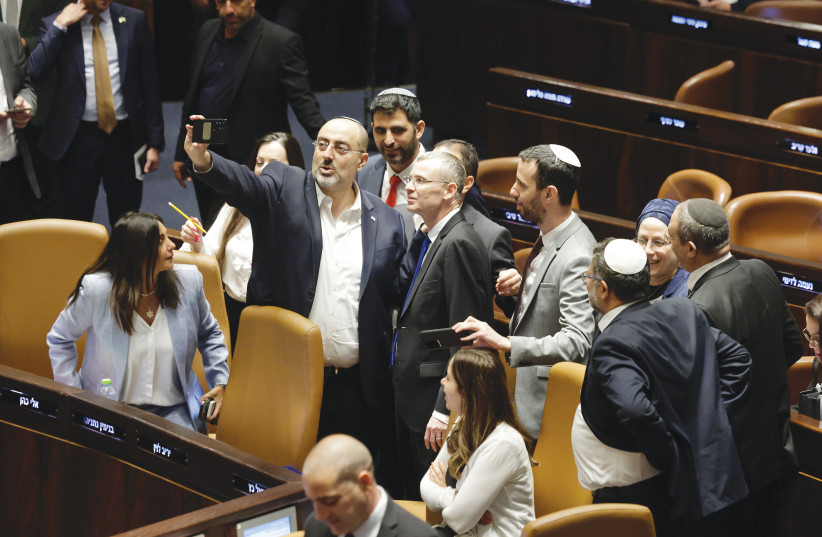If this were a movie – “The 2023 Crisis of Israeli Judicial Reform” – we know how it would end. Today, not too many weeks after the 75th anniversary of the State of Israel, with blue and white fireworks in the background, and the soundtrack playing “Hatikva,” the camera pans the crowds – Ashkenazim, Sephardim, black, white, religious, secular – all clasping shoulders, swaying side to side, and singing the Israeli equivalent of “Kumbaya.” Good for another 75 years.
That is how the movie ends.
But we’re 10 minutes away from the end of the movie, and even if we think we know how it should end, no one seems to know how to get from here to there.
The coalition government still thinks (and they’re not wrong) that they were elected fairly and democratically, and that it’s not fair for “the lefties” to be protesting just because they don’t like the results. (The fact that there are now significant numbers of the Likud ruling party marching and speaking publicly against judicial reform doesn’t negate the fact that this government was democratically elected, including by those self-same Likud members. The fact that democracy doesn’t involve the tyranny of the minority is being ignored.)
The opposition thinks (and they’re not wrong) that a single election (especially in a country where we have elections so often, where the results are so different week by week, and where polling now indicates the country has changed its collective mind) does not constitute any sort of sweeping mandate for such widespread changes, and that aside from the content, such far-reaching changes shouldn’t be happening this precipitously, particularly since this whole overhaul was not announced until after the government was in office. (The fact that a large percentage of those marching, in fact, support some amount of judicial reform, has been lost amid the rhetoric and commotion.)

The longer it goes on, the worse it all gets. Everyone has become entrenched in their viewpoint.
The coalition is positively giddy with their successes and seems inclined to keep going. Pardons for all! Money for all! A personal militia to keep things in line! Selfies in the Knesset!
The opposition, fueled by their protests, is also now thinking more broadly: After all, judicial reform isn’t the only problem in Israel. Why not continue on to all the other injustices they’d like to see corrected? Why not insist on a new government entirely?
We know the end of the movie is coming soon. The country can’t continue like this.
Internal work has ground to a halt; neighbors are watching alertly; enemy countries have already made forays to see just how dysfunctional we are. Former supporters are moving their business elsewhere; US military support is being delayed, and the US-Israel relationship reconsidered.
We’ve taken turns being on strike: universities, hospitals, municipalities, doctors, lawyers, shops. GDP is already going down, as hi-tech companies start to move out.
Moody’s and Morgan Stanley just lowered our financial profile; our credit rating is being reviewed. Last week’s Start-Up Nation poll revealed that hi-tech capital, and manpower, are being redirected. Our military deterrence is at risk.
As the dissent continues to grow, despite the toll 29 weeks of non-stop protests have taken; as the extremist elements in the government have encouraged violent responses; as the haredim, who helped put this government into office, are backing up and rethinking their position; civil war, though no one wants it, is sounding less unlikely.
But instead of everyone realizing that compromise is not only inevitable, but desirable, everyone is digging their heels in deeper.
How do we get to the end of the movie?
Not only do we need to solve the current crisis, we need to implement a solution so that we won’t have this problem again. We need a written constitution, real checks and balances, creative and cooperative thinking.
We need to freeze the legislation indefinitely, with no sword of Damocles hanging overhead while negotiations occur.
We need to give, not just opposition leaders, but the actual protest leaders, a seat at the table at the President’s Residence, so they can speak for the protest movement.
We need to create a real constitution, with true checks and balances.
Only in that slow, careful way can we pacify our foreign allies, appease the financial market, and most of all, do the internal healing we need to do to once again be a nation united.
The Hebrew word for compromise, peshara, dates back to pesher from Ecclesiastes, where it has traditionally been translated as “solution.”
“Who is a wise person? (He) who knows the solution to a problem” (Ecclesiastes 8:1).
But maybe that has been mistranslated.
Maybe the etymology of peshara as compromise, is because the wise person is he who knows the compromise to a problem.
Hungary and Poland have provided us with the economic and political models of what happens when this all goes wrong, when there is no compromise, when totalitarianism wins. We can’t let that happen here; no one wants that. We can still be the Start-Up Nation, a light unto the nations, a model for how government is supposed to work.
It is time for the sides to sit down with each other and figure out the solution, the compromise, to this problem. It is time for a real written constitution, for real checks and balances, for true judicial (and legislative) reform.
This is the opportunity to rewrite the ending, to rise to the occasion, to remember that we are, albeit sometimes dysfunctional, family. The fact that no country in the world has successfully managed navigating this doesn’t matter. We can do it.
It would be nice if we could figure out Ecclesiastes’s compromise. We need the happy ending to the movie, in time to all celebrate a belated Independence Day together, singing “Kumbaya.”
We’re a country of miracles. We can do it.
The writer runs JewishSpeakersBureau.com.
